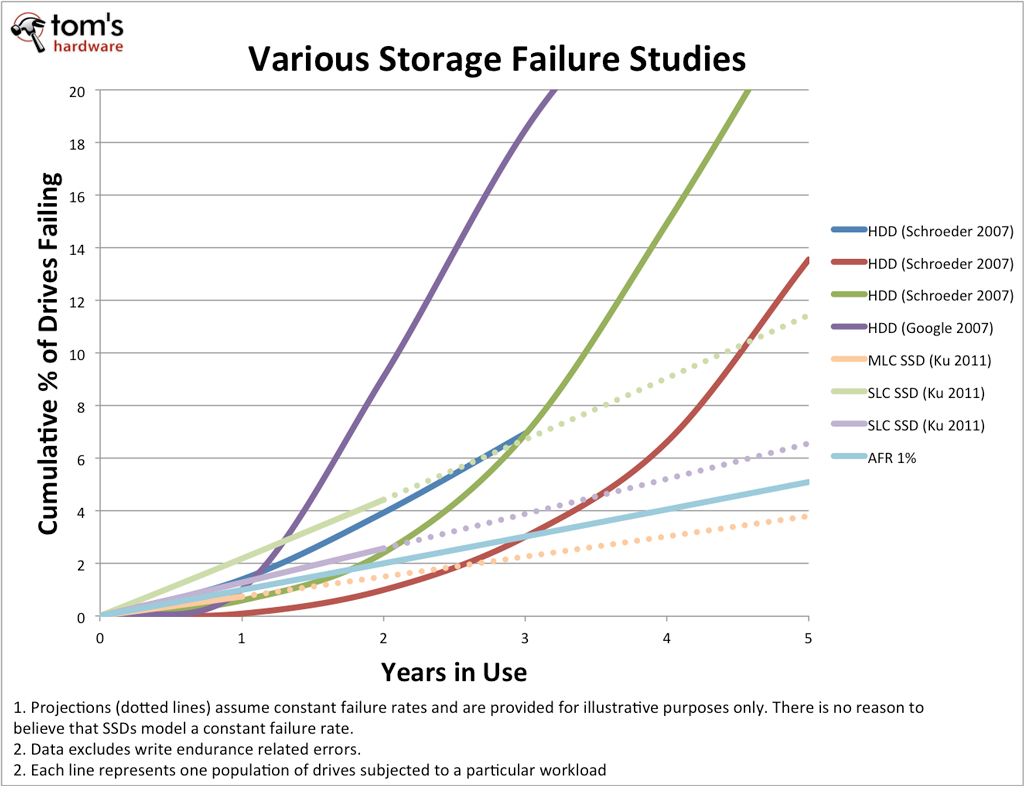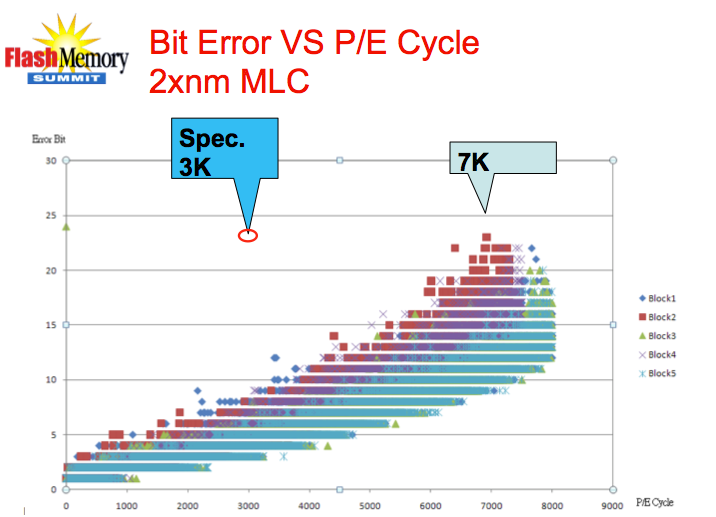2011 Flash Memory Summit Recap: Tom's Hardware Represents
SSD Adoption And The Peripheral Issues
It was a little surprising that we were the only ones to talk about solid-state media reliability. Frankly, we got more inquiries on this part of our presentation than the benchmarking slides. This is really one area where SSD manufacturers could be more transparent; all customers, enterprise and desktop alike, are hungry for this type of information.
As solid-state technology continues to mature, the performance delta between different products narrows. That's why we believe addressing reliability is "the next frontier." After all, what good is superior performance if you can't trust the storage media to operate dependably?
We've had many IT professionals express their frustration to us because manufacturers aren't willing to share this data, which is what precisely what they need in order to deploy the technology in mission critical environments.
The Consumer Side
On the consumer, we still believe that concerns about write endurance aren't an issue. For more information, check out Investigation: Is Your SSD More Reliable Than A Hard Drive? for the calculations. Even with a 120 GB SSD based on 25 nm NAND flash, you’d have to write something like 500 GB a day to kill the drive in under a year. That's pretty unlikely when you consider the average user writes less than 10 GB a day.
Plus, there's this misconception that a 5000 P/E cycle-rating means the drive goes dead when you hit 5001. That's not the case, though. C.C. Wu, director of engineering at Innodisk, gave an interesting presentation at the Flash Memory Summit, showing that it's often possible to exceed the rated P/E spec of NAND flash, sometimes by two or three times, without overwhelming the ECC engine. That means it's still likely that your SSD will continue to operate even after it exceeds its rated life.
Of course, we have other factors to consider, too. The idea of spending many times more money on less capacity in the name of performance simply doesn't resonate well with many folks, particularly when storage needs continue exploding. Let's say you have an extra $300 left in the budget for your next HTPC. Do you spend that on 6 TB of storage for a library of digitized movies or the fastest 128 GB SSD to improve performance? Even folks who can afford pricey SSDs will sometimes pick capacity over performance. Why? The amount of data we need to save expands at a very fast pace. SSDs are and will continue to be a luxury item that we buy after capacity requirements are met.
Get Tom's Hardware's best news and in-depth reviews, straight to your inbox.
The good news is that NAND continues to benefit from some of the most advanced manufacturing technologies available. You can bet on prices per gigabyte dropping over time. And hopefully, reliability continues to receive the emphasis it deserves. That should be sweet music to the ears of every technologist. And it's all the more reason to pay attention as SSDs continue evolving.
Current page: SSD Adoption And The Peripheral Issues
Prev Page Jumping On The SSD Bandwagon-
compton Is there a way for a user to record their own week of disk access, and in so doing make their own Storage Bench (with the assistance of some other software)?Reply -
Still very surprised hybrid hard disks like the Momentus XT aren't getting more R&D. If they included even half the capacity of a mainstream HD and a quarter the capacity of a mainstream SSD, they'd have an amazing product. Just think: a 500GB platter paired with 32GB SSD for, what, $150? I'd buy that in a jiffy.Reply
-
chovav caywen - I don't think I agree. This approach means you will lose both SSD and hard drive if one fails. Second, a small SSD like that will only be useful for caching, which we all saw until now isn't worth much.Reply
lastly, wanting to upgrade will mean having to upgrade both, instead of one. I think this is one of the reasons why the XT was never so popular...
O.T - nice read. It did feel a bit as though it was stopped in the middle.. -
mkrijt chovavIt did feel a bit as though it was stopped in the middle..Reply
That was exactly what I was thinking. I was looking for the "next page" button but couldn't find it. I was like wtf? went back to the first page to look at the index finding it really ended there :( -
cknobman mkrijtThat was exactly what I was thinking. I was looking for the "next page" button but couldn't find it. I was like wtf? went back to the first page to look at the index finding it really ended thereReply
LOL me too!!!
For me personally I am willing to drop up to $120 on a SSD but that is the breaking poing for me and I am not willing to settle for anything less than 120GB due to the performance drop in smaller SSD's and also how much space I need for my OS and other apps (and no I am not counting data like movies or pics).
The main thing holding me off on purchasing a SSD right now is the lack of confidence in reliability. The bugs in Intel, Sandforce, and whatever controller crucial uses in the m4 makes me worried. Just looking at articles here and user reviews on NewEgg was enough for me to get gun shy and wait. There are few things I hate more than having to setup my system and even though I can ghost my boot drive there will always be some loss in a drive failure and that is just something I want to avoid if I can. Unfortunately it just seems like owning a SSD right now leaves too high a risk of drive failure. Plus it does not help reading how manufacturers refuse to comment or give any real hard data on reliability. -
nforce4max What about page file related write attributed to normal use? It is very easy to see more than 10gb a day worth of writes depending on the apps used.Reply -
razvanz nforce4max I agree with you. I haven't seen any SSD tests using bittorent. How does a SSD fare against a HDD in bittorent usage. I think bittorent will easily overwhelm the read/write cycles of a SSD.Reply -
JamesAbel On the surveys on "willingless to pay for SSDs" - has this ever been done on someone that has TRIED an SSD? Reading about a benchmark is different than experiencing it. On my SSDs, I see huge benefits in things like app load time vs. an HDD. Also, SSDs are much faster vs. HDDs when multiple apps are running and causing lots of head seeks (drive thrash). Give someone an SSD for a month and then give them back an HDD - I think many won't be so willing to switch back (and be willing to pay from there on out).Reply -
Mark_Alberta I have been testing various SATA SSD's for recording CCTV footage for several months now. The results have been disappointing when compared to mechanical hard drives. First off, unless I set the maximum file size to 85% or less of the drive's capacity, instead of 95% with say, a WD Caviar Black, the drive would over write the data 3-4 times and then suddenly become undetectable on the system until I reboot it. Not a good thing when considering the purpose of the unit. This has occurred on three different manufacturer's drives, so it's obviously not a one-off issue. Another interesting problem that can up was on the 40GB OS drive, the detected volume dropped from 37GB to roughly 24GB. I reformatted the drive, re-installed the OS and everything returned to normal. I am going to continue to try and perfect a system using SSD's, but it is a lot more of a headache that the simplicity of plugging in a 3.5" mechanical drive and moving on.Reply -
drwho1 I would be willing to pay from $150 to @200 top for a 500GB SSD.Reply
When prices and size ratio meet this price standards then I would take a serious look into SSD's.
Have in mind that current 2TB hard drives are under $100 dollars (true they are green drives). But when a SSD per GB cost 10 to 20 times as much a hard drive is just not right to me.

